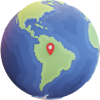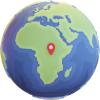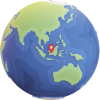Case studies are organised by region, with each region featuring links to the countries where the case studies are located.
Colombia

In May 2013, InSight Crime reported that Colombian authorities seized 11 tons of contraband meat in Cucuta, near the Venezuelan border. These contraband goods were linked to money laundering operations by guerrilla and drug trafficking groups. The contraband meat, originating from Venezuela, was packed in a truck and discovered in Cucuta, Norte de Santander, Colombia. The meat was estimated to come from about 600 cows. Authorities believe these groups use the meat trade to launder drug money and generate revenues to purchase coca, a key ingredient in cocaine production. The process involves buying meat in Venezuela at black market prices and selling it in Colombia, taking advantage of the significant difference between the official and black market exchange rates of the Venezuelan bolivar. By purchasing meat cheaply on the black market in Venezuela and selling it at higher prices in Colombia, the groups maximise their profits. The FARC along with neo-paramilitary groups like the Urabeños and Rastrojos, are implicated. These groups are heavily involved in drug trafficking and use various methods, including contraband trade, to launder their illicit earnings.
Keywords: Latin America, Colombia, cattle, primary production, terrorist and conflict financing, drug trafficking, money laundering
Sources: https://insightcrime.org/news/brief/contraband-meat-colombia-drug-trafficking-cocaine/
Guatemala

In an article by Mongabay, it is reported that Guatemala’s Sierra del Lacandón National Park is nearing a state of collapse due to rampant deforestation and land grabbing. Over the past two years, the park has lost thousands of hectares of forest, raising concerns among government officials and conservationists that the area may soon be lost to illegal actors. Some communities that were already living in the area when the park was established have declined to cooperate with the government’s plans to work together on sustainability, education, and public health projects. Instead, these communities have expanded their presence with roads, cattle ranching, and airstrips for drug planes, all of which have exacerbated deforestation rates. The park is part of the larger Maya Biosphere Reserve, which covers over 2 million hectares of rainforest across northern Guatemala and connects to other protected forests in Mexico and Belize. The reserve is home to a rich biodiversity, including 56 species of fish, 24 species of amphibians, 60 species of reptiles, 326 species of birds, and 69 species of mammals, as well as over 30 archeological sites from Mayan and other Mesoamerican civilizations.
Keywords: Latin America, Guatemala, cattle, primary production, land grabbing, drug trafficking, illegal deforestation
Source: https://news.mongabay.com/2023/05/guatemala-national-park-nearing-collapse-amid-land-grabbing-deforestation/

A Mongabay report warns that organised crime is exerting unprecedented pressure on Guatemala's largest rainforest, the Maya Biosphere Reserve. The reserve has faced a wave of land invasions since the beginning on 2024, including in previously untouched areas such as Naachtún-Dos Lagunas Biotope. The invaders, often heavily armed, are backed by criminal groups seeking to exploit the government's agrarian reform policies to launder money through cattle ranching and drug trafficking across the Mexican border. As a result, the reserve is experiencing severe threats from deforestation, illegal livestock farming, and forest fires. In March 2024, a patrol discovered extensive markings and a road being cleared in Mirador National Park, signalling a planned large-scale invasion. Despite arrests and patrols, the encroachment persists. Mongabay also explains that the situation is exacerbated by the political transition with the inauguration of President Bernardo Arévalo, whose government supports rural and Indigenous communities. Proposed reforms to Guatemala's protected areas law could loosen restrictions on agriculture and livestock in the reserve in order to address longstanding issues related to land ownership, further endangering the area.
Keywords: Latin America, Guatemala, cattle, primary production, serious organised crime, agriculture, drug trafficking, illegal production, deforestation, money laundering
Sources: https://news.mongabay.com/2024/05/organized-crime-puts-unprecedented-pressure-on-guatemalas-largest-rainforest/
Honduras

Cattle can both themselves be laundered (if they are grazed on land that has been illegally cleared and converted to pasture) and used as a means of laundering criminal proceeds from other exploits, like drugs trafficking. In Brazil, cattle have been laundered to obscure their links to land clearing, when they are moved from ranches that have contributed to land conversion through “clean” ranches that have not resulted in recent forest loss.
In 2009, several Brazilian slaughterhouses signed the Terms of Adjustment of Conduct, an initiative of the Federal Prosecution Office and the Public Commitment on Cattle Ranching, and a voluntary protocol developed by Greenpeace, which precludes them from purchasing cattle reared on deforested land. However, a single cow might pass through up to 10 farms before it is slaughtered (from birth, through rearing and fattening). Any of these farms might be linked to illegal deforestation but many slaughterhouses assess links to deforestation only on the last farm a cow passes through - their direct supplier. As long as the last farm in the supply chain is from a “clean” ranch that is free from recent deforestation then slaughterhouses (and subsequent transporters and retailers, like supermarkets) are likely to mark them as deforestation-free, even if they have spent the majority of their life on and have passed through nine other ranches that have been converted from forested land. Indeed, data indicates that some ranchers own both “dirty” and “clean” ranches and launder cattle through their own properties. So long as one property is kept clean, they can continue to clear land for cattle grazing purposes on any number of other ranches.
Other investigations by Global Witness have found that ranchers have fraudulently edited the boundaries of their ranch once they have cleared areas of land, so that this land conversion is no longer included within the property’s scope and the ranch appears free from deforestation. This is alleged to be the case for the Fazenda Espora de Ouro II Ranch in Brazil’s Pará state, which Global Witness also found appears to be registered in the name of an individual who could not legally be its owner (based on assessment of a database of land titles and beneficiaries).
Cattle can also – and concurrently – be used as a means of laundering the proceeds of illicit activity. Drug traffickers – especially in Colombia (where the traceability of beef produce is particularly poor), Honduras, and Guatemala – are known to launder revenue from drugs by buying or grabbing land which they convert into pasture for cattle, which they also purchase with narcotrafficking proceeds. When the cattle are sold, profits are hard to trace back to the drug network and their illicit proceeds are effectively laundered. This practice, known as “narco-ranching”, is suspected of contributing up to 87% of deforestation in the Maya Biosphere Reserve, a large UNESCO heritage area of forest which covers over 2 million hectares of rainforest across northern Guatemala and borders other protected forests in Mexico and Belize. The Reserve is highly vulnerable to deforestation by crime groups due to its strategic location along a significant drug trafficking route up through Guatemala and Mexico leading to the US.
Cattle ranching in such areas also frequently serves to hide airstrips and production facilities used by traffickers to produce and transport drugs or other illicit products. Airstrips now pepper the Maya Biosphere reserve, which are used by planes coming in from Colombia and Venezuela with cocaine to be smuggled across the border into Mexico.
Keywords: Latin America, Honduras, primary production, money laundering, illegal deforestation, human trafficking, serious organised crime
Source: https://www.vox.com/science-and-health/2022/10/19/23403330/amazon-rainforest-deforestation-cattle-laundering

In Honduras' Río Plátano Biosphere Reserve, organised crime and drug trafficking are significantly contributing to environmental degradation and social instability. The UNESCO site, vital for its biodiversity, faces rampant illegal cattle ranching and land clearing by narcotraffickers seeking to launder money through cattle farming. These criminal groups exploit the absence of effective law enforcement and weak governance, using the remote area to grow their drug operations and clear land for illegal ranching, which destroys forest habitats. Corruption further exacerbates the problem, with local authorities often complicit or powerless against these powerful criminal networks. The unchecked expansion of drug trafficking and organised crime into the reserve not only threatens the environment but also destabilises local communities.
Keywords: Latin America, Honduras, cattle, primary production, serious organised crime, drug trafficking, rule of law, illegal production
Source: https://news.mongabay.com/2018/12/there-are-no-laws-cattle-drugs-corruption-destroying-honduras-unesco-site/
Kenya

The 2023 Trafficking in Persons Report on Kenya assesses the country's efforts and challenges in combating human trafficking. Key findings include concerns about inadequate resources for victim protection, limited legal safeguards for vulnerable populations, and the prevalence of trafficking in refugee camps and informal settlements. It was reported that traffickers exploit Kenyan children in labor trafficking in cattle herding. Recommendations urge Kenya to strengthen law enforcement responses, increase funding for victim services, and address the root causes of trafficking through education and economic empowerment. The report emphasises the importance of international cooperation and partnerships to combat cross-border trafficking networks effectively.
Keywords: Sub-Saharan Africa, Kenya, cattle, primary production, human trafficking, child labour
Source: https://www.state.gov/reports/2023-trafficking-in-persons-report/kenya/
Mexico

According to a report by Mongabay, the illegal expansion of palm oil production in Mexico, particularly in the areas Chiapas, Campeche, Tabasco, and Veracruz, has led to significant deforestation. Between 2014 and 2019, at least 5,400 hectares of forests and jungle were lost due to oil palm cultivation. Now, the plantations are beginning to encroach on protected areas, such as the La Encrucijada Biosphere Reserve. During the 1990s, Mexican state programmes promoted palm oil cultivation, emphasising its superior economic benefits. This has pushed farmers towards the commodity, which has been very profitable for local communities. But now, research indicates that oil palm plantations have replaced not only cattle pastures and agricultural lands but also young forests and high jungle areas. Significant deforestation has been detected in municipalities like Benemérito de las Américas, Marqués de Comillas, Palenque, and Salto de Agua, and has affected critical ecosystems. As major companies begin to expand beyond permit areas, acquisition is becoming increasingly illegal, sometimes carried out without proper authorisation for land-use changes.
Keywords: Latin America, Mexico, palm oil, primary production, illegal deforestation, illegal production
Sources: https://news.mongabay.com/2023/06/palm-oil-the-crop-that-cuts-into-southeastern-mexicos-jungles-and-mangroves/

Javier Duarte, former governor of Veracruz, Mexico, is implicated in a scheme where cattle ranching was used to launder money embezzled from public funds. An investigation by Animal Político found Duarte and his network purchased expensive cattle and large ranches, using them to clean hundreds of millions of pesos. This process allowed them to integrate illicit funds into the legitimate economy by taking advantage of the agricultural sector’s cash-based transactions and lax oversight.
Duarte, who governed from 2010 to 2016, had previously been convicted in 2018 for criminal association and money laundering, receiving a nine-year prison sentence. His case underscores the vulnerability of agriculture, especially cattle ranching, to financial crimes in Mexico. The revelations reflect ongoing difficulties in curbing corruption and organised crime, which increasingly infiltrate legitimate businesses to obscure the origins of illicit profits.
Keywords: Latin America, Mexico, cattle, primary production, money laundering, agriculture, organised crime, corruption and bribery
Source: https://insightcrime.org/news/governor-cattle-money-laundering-mexico/
Nigeria

A report by The Independent has highlighted the economic, social and environmental impacts of cattle open grazing in Nigeria. While some argue that open grazing sustains the livelihood of the Fulani pastoralists and preserves cultural heritage, others claim it serves as a mechanism for strategic land grabs, contributing to land conflicts and environmental degradation. First of all, it is being increasingly demonstrated that open grazing, where herders allow their animals to graze freely over large areas of land, is in reality inefficient and harmful to the environment. Findings hold that this traditional practice leads to deforestation, soil erosion, and water pollution. As a consequence, these practices have disrupted the local economy and contributed to conflict between Fulani pastoralists and farmers over land. In addition, Nigeria's history of land tenure has often favoured elites over indigenous communities, exacerbating tensions. Efforts to regulate open grazing, such as the anti-open grazing bill currently in the Nigerian Senate, aim to establish regulations for ranching and address conflicts between herders and farmers. However, the bill faces opposition, with some arguing that the National Assembly lacks the authority to legislate on this matter.
Keywords: Sub-Saharan Africa, Nigeria, cattle, primary production, deforestation
Sources: https://independent.ng/how-sponsors-of-herders-insist-on-open-grazing-to-grab-land-security-experts-farmers-reveal/#google_vignette
Paraguay

The article titled “Paraguayan authorities complicit in illegal razing of country’s forests by EU-linked agribusiness” published on Earthsight, reveals the complicity of Paraguayan authorities in the illegal deforestation of the country’s forests by EU-linked agribusiness. The article is part of Earthsight’s “Grand Theft Chaco” series, which exposes the links between illegal deforestation for cattle ranching in the Paraguayan Chaco and leather used by car giants in Europe. The investigation focuses on PNCAT, the protected land belonging to the Ayoreo Totobiegosode people, including some of the last uncontacted groups in the world. The entire Chaco ecosystem is under intense attack by ranchers and soy growers, leading to the loss of its native forests and rich biodiversity. Two ranches within PNCAT, Caucasian SA and Cooperativa Chortitzer, illegally cleared over 2,700 and 500 hectares of forests respectively between 2018 and 2019 in contravention of government resolutions. Another farm, Yaguareté Porã, has a long history of illegal land dealings and pasture development within PNCAT dating back nearly 20 years. Earthsight was able to link hides from PNCAT to Italian automotive leather giant Conceria Pasubio and on to BMW and Jaguar Land Rover.
Keywords: Latin America, Paraguay, cattle, soy, primary production, agriculture, illegal deforestation
Source: https://www.earthsight.org.uk/news/analysis/paraguayan-authorities-complicit-in-illegal-razing#:~:text=Bono%20for%20Earthsight-,Paraguayan%20authorities%20complicit%20in%20illegal%20razing,forests%20by%20EU%2Dlinked%20agribusiness&text=Earthsight's%20Grand%20Theft%20Chaco%20series,by%20car%20giants%20in%20Europe.


The Environmental Crimes Financial Toolkit is developed by WWF and Themis, with support from the Climate Solutions Partnership (CSP). The CSP is a philanthropic collaboration between HSBC, WRI and WWF, with a global network of local partners, aiming at scaling up innovative nature-based solutions, and supporting the transition of the energy sector to renewables in Asia, by combining our resources, knowledge, and insight.


